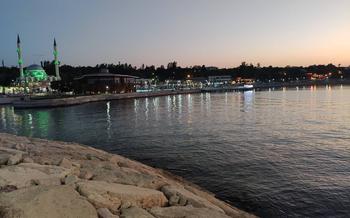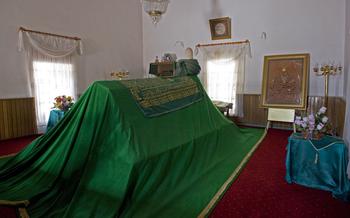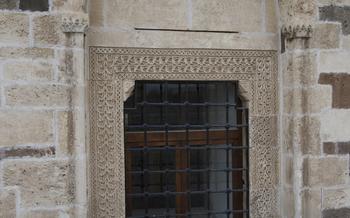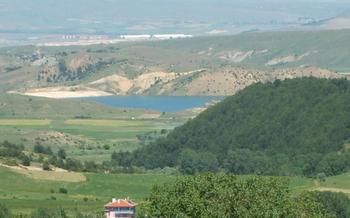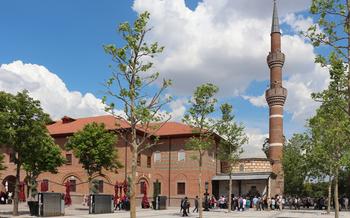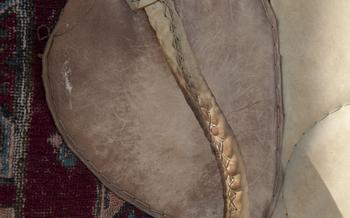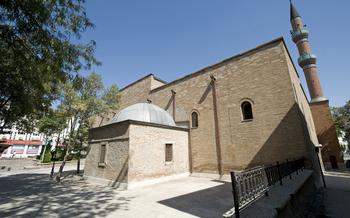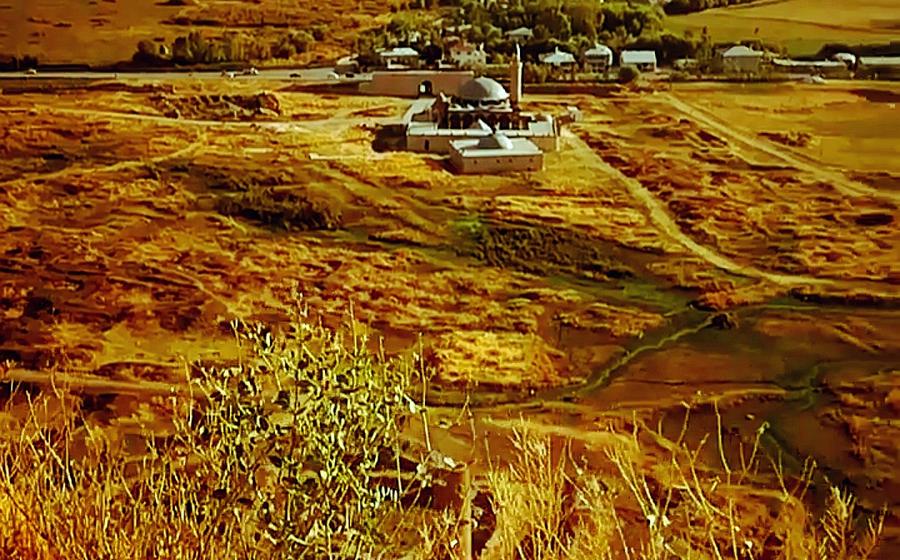
Seyyid Fehim Arvasi Shrine
- Seyyid Fehim Arvasi Shrine: A Spiritual Haven in Van
- Location and Accessibility:
- Visiting Hours and Dress Code:
- Exploring the Shrine's Interior: A Journey of Faith and Discovery
- Spiritual Significance: A Beacon of Faith and Tradition
- Cultural Significance
- Prayer and Reflection
- Festivals and Celebrations
- Local Crafts and Handicrafts
- Historical Context
- Architectural Style
- Local Cuisine
- Photography and Videography
- Interfaith Dialogue and Understanding
- Insider Tip:
Seyyid Fehim Arvasi Shrine: A Spiritual Haven in Van
Nestled in the heart of Van, the Seyyid Fehim Arvasi Shrine stands as a beacon of spirituality and cultural significance. This sacred site, dedicated to the renowned Sufi master Seyyid Fehim Arvasi, holds a deep reverence among Muslims and visitors alike. Built in the 19th century, the shrine encapsulates the essence of traditional Islamic architecture, boasting intricate carvings, a majestic domed ceiling, and awe-inspiring calligraphy. As a pilgrimage site for Sufi followers, the shrine exudes a palpable spiritual energy, attracting pilgrims from far and wide seeking solace, guidance, and a deeper connection with their faith.
Personal anecdotes and experiences:
During my visit to the Seyyid Fehim Arvasi Shrine, I was struck by the profound sense of tranquility that permeated the air. As I stepped inside, the intricate tilework and ornate decorations seemed to transport me to a different era. The soft murmur of prayers and the gentle scent of incense created an atmosphere of reverence and devotion. I felt a deep sense of peace and serenity as I explored the shrine's sacred spaces, marveling at the beauty and craftsmanship that adorned every corner.
Location and Accessibility:
The Seyyid Fehim Arvasi Shrine is situated in the heart of Van, a city in eastern Turkey. Its exact address is Cumhuriyet Caddesi, Fevzi Çakmak Mahallesi, Van Merkez. To reach the shrine, visitors can take public transportation, such as buses or taxis, and ask to be dropped off at the Fevzi Çakmak Mosque stop. From there, it's a short walk to the shrine. Parking is also available in the vicinity for those arriving by private vehicle.
The shrine is conveniently located near several landmarks and attractions, making it easy to combine a visit with other sightseeing activities. The Van Museum, showcasing the region's rich history and culture, is just a few minutes away on foot. Additionally, the beautiful Van Lake, renowned for its stunning views and natural beauty, is a short drive from the shrine. Visitors can enjoy a scenic stroll along the lakeshore or take a boat tour to explore the lake's hidden gems.
Visiting Hours and Dress Code:
The Seyyid Fehim Arvasi Shrine welcomes visitors during specific hours, typically from sunrise to sunset. It is recommended to plan your visit accordingly to avoid any inconvenience. While the shrine is open to people of all faiths and backgrounds, it is essential to respect the religious significance and sanctity of the site. Appropriate attire is required, as a sign of respect for the spiritual nature of the shrine. Modest clothing that covers the shoulders and knees is generally expected. Visitors should avoid wearing revealing or disrespectful clothing. Additionally, it is customary to remove shoes before entering the shrine, as a symbol of reverence and humility.
Exploring the Shrine's Interior: A Journey of Faith and Discovery
As you step inside the Seyyid Fehim Arvasi Shrine, a sense of awe and tranquility envelops you. The domed ceiling, adorned with intricate carvings and colorful tiles, draws your gaze upward, inspiring a sense of wonder and devotion. The walls are adorned with verses from the Quran, beautifully inscribed in elegant calligraphy, adding to the spiritual atmosphere of the shrine.
Notable features within the shrine include the mihrab, a niche indicating the direction of Mecca, which is intricately carved and adorned with colorful tiles. The minbar, or pulpit, is another significant element, used by the imam to deliver sermons and religious teachings. It is crafted from fine wood and adorned with intricate carvings, reflecting the skill and artistry of the craftsmen who created it.
Historical artifacts and relics are also on display within the shrine, providing a glimpse into the past and the rich history of this sacred site. These artifacts include old manuscripts, prayer beads, and other religious objects that have been carefully preserved and showcased for visitors to appreciate.
Spiritual Significance: A Beacon of Faith and Tradition
The Seyyid Fehim Arvasi Shrine holds immense spiritual significance as a pilgrimage site for Muslims, particularly for followers of the Naqshbandi Sufi order. It serves as a center of spiritual guidance and learning, attracting devotees from near and far who seek solace, enlightenment, and connection with the divine. Within the shrine's hallowed walls, Sufi traditions and practices are meticulously observed, perpetuating a rich spiritual heritage that has been passed down through generations.
At the heart of the shrine's spiritual significance lies the belief that it is the resting place of Seyyid Fehim Arvasi, a revered Sufi master and scholar. His teachings and legacy continue to inspire and guide countless individuals, who come to the shrine to pay homage to his memory and seek blessings. The shrine has become a focal point for spiritual seekers who yearn for a deeper connection with their faith and a path towards self-realization.
Religious ceremonies and rituals are regularly held at the shrine, further enhancing its spiritual atmosphere. These ceremonies often involve chanting, prayers, and Sufi whirling, a form of devotional dance that is deeply rooted in the Naqshbandi tradition. The rhythmic movements and melodies create a mesmerizing spectacle that transports participants to a state of spiritual ecstasy.
Beyond its spiritual significance, the Seyyid Fehim Arvasi Shrine also plays a crucial role in preserving and promoting Sufi heritage. It serves as a living testament to the enduring traditions, rituals, and teachings of Sufism, a mystical branch of Islam that emphasizes introspection, self-awareness, and the pursuit of divine love. Through its continued existence and the devotion of its followers, the shrine ensures that the legacy of Sufism remains vibrant and accessible to future generations.
Cultural Significance
The Seyyid Fehim Arvasi Shrine holds immense cultural significance, deeply intertwined with Turkish identity and heritage. As a symbol of spirituality and devotion, it has contributed significantly to the local art, architecture, and craftsmanship. The shrine's intricate carvings, colorful tiles, and graceful calligraphy reflect the region's rich artistic traditions. Moreover, it has played a crucial role in preserving and promoting Sufi heritage, a mystical branch of Islam known for its emphasis on inner purification and direct connection with the divine. The shrine serves as a living testament to the enduring legacy of Sufi practices and teachings in the region, attracting pilgrims and visitors from far and wide.
Prayer and Reflection
The Seyyid Fehim Arvasi Shrine exudes an aura of tranquility and serenity, inviting visitors to immerse themselves in prayer and reflection. Designated areas within the shrine provide a tranquil space for individuals to connect with their spiritual side. The serene surroundings and the soothing atmosphere create an ideal environment for contemplation and meditation.
Beyond the physical space, the shrine holds deep spiritual significance for Muslims. Many pilgrims visit the shrine to seek blessings, offer prayers, and pay homage to the revered Sufi saint. The shrine's spiritual energy is palpable, and visitors often experience a sense of peace and connection with the divine.
In the tranquil corners of the shrine, visitors can find solace and refuge from the bustling world outside. The shrine provides a sanctuary for those seeking spiritual guidance, inner peace, and a deeper connection with their faith. Whether you are a devout Muslim or simply seeking a moment of tranquility, the Seyyid Fehim Arvasi Shrine offers a profound experience of spiritual connection and reflection.
Festivals and Celebrations
The Seyyid Fehim Arvasi Shrine is not only a place of spiritual significance but also a vibrant center for cultural celebrations. Every year, the shrine hosts a series of festivals and events that draw thousands of visitors from near and far. The most prominent of these is the annual Urs-e-Seyyid Fehim Arvasi, a week-long festival held in honor of the shrine's patron saint. During this festival, the shrine is adorned with colorful lights and decorations, and the air is filled with the sounds of music, prayers, and recitations. Sufi musicians perform traditional qawwali music, while devotees engage in devotional dances and rituals. The festival culminates in a grand procession, where a sacred relic of the saint is carried through the streets of Van, accompanied by a sea of pilgrims and well-wishers. Participating in these festivals is a unique and immersive experience that allows visitors to witness the rich cultural heritage of the region and to connect with the local community on a deeper level.
Local Crafts and Handicrafts
In the vicinity of the Seyyid Fehim Arvasi Shrine, a vibrant market unfolds, where artisans and craftsmen showcase their exquisite creations. These talented individuals pour their hearts and souls into crafting unique souvenirs and memorabilia that capture the essence of the region's rich cultural heritage. From intricately woven carpets and shimmering jewelry to hand-painted ceramics and carved wooden artifacts, there's a treasure trove of traditional crafts to discover.
As you stroll through the market, you'll be captivated by the vibrant colors, intricate designs, and meticulous craftsmanship of each item. Whether you're looking for a meaningful souvenir to cherish or a thoughtful gift for loved ones back home, you're sure to find something special here. By supporting these local artisans, you not only take home a piece of Turkish culture but also contribute to preserving and promoting the region's unique heritage.
One of the most striking features of the local handicrafts is the use of traditional motifs and symbols. These intricate designs often draw inspiration from Islamic art and architecture, reflecting the deep spiritual and cultural significance of the shrine. From the graceful calligraphy that adorns jewelry to the geometric patterns that dance across carpets, each piece tells a story and carries a unique meaning.
As you browse the market, don't hesitate to engage with the artisans and learn more about their craft. They'll be delighted to share their stories, techniques, and inspirations, offering you a glimpse into the vibrant world of Turkish craftsmanship. Whether you choose to purchase a stunning piece of jewelry, a handwoven carpet to grace your home, or a decorative ceramic to brighten your space, you'll be taking home a piece of Van's rich cultural tapestry.
Historical Context
The Seyyid Fehim Arvasi Shrine has a rich historical context that intertwines with the development of the city of Van and the region's religious and political history. The shrine was constructed during the Ottoman period, a time of significant cultural and architectural influence. It is believed to be the final resting place of Seyyid Fehim Arvasi, a revered Sufi mystic and scholar who played a pivotal role in shaping the spiritual and intellectual landscape of the region.
Throughout history, the shrine has served as a center for Sufi teachings and practices, attracting followers from near and far. It has also been a place of pilgrimage for Muslims seeking spiritual guidance and blessings. The shrine's association with Seyyid Fehim Arvasi and its enduring significance have made it an integral part of Van's cultural and religious heritage.
In the broader context of Turkish history, the Seyyid Fehim Arvasi Shrine stands as a testament to the rich tapestry of religious traditions and practices that have shaped the country's cultural identity. It is a reminder of the enduring influence of Sufism and the role of spiritual leaders in shaping the lives of countless individuals and communities.
Architectural Style
The Seyyid Fehim Arvasi Shrine showcases a blend of architectural styles, reflecting the rich cultural heritage of Van and the region. The dominant architectural style is Seljuk, characterized by its intricate carvings, pointed arches, and the use of blue and turquoise tiles. The shrine's dome, a prominent feature, is adorned with intricate geometric patterns, showcasing the artistry and craftsmanship of the era.
The gateway to the shrine, known as the "peshtak," features a striking muqarnas arch, a decorative element commonly found in Islamic architecture. The interior of the shrine is adorned with beautiful calligraphy, Quranic verses, and decorative motifs, creating a serene and spiritual atmosphere. The overall design of the shrine seamlessly blends elements from various cultures and periods, making it a unique and captivating architectural masterpiece.
Local Cuisine
The vicinity of the Seyyid Fehim Arvasi Shrine offers a tantalizing array of culinary delights, inviting you to embark on a gastronomic journey that mirrors the region's unique cultural heritage. Immerse your taste buds in the traditional dishes and specialties that have been passed down through generations, showcasing the rich tapestry of flavors that define this vibrant region.
Stroll through the labyrinthine streets surrounding the shrine and discover an array of eateries and restaurants, each exuding its own charm and character. Indulge in the aromatic kebabs, grilled to perfection over hot coals, or savor the melt-in-your-mouth tenderness of succulent lamb stews, simmered with an array of herbs and spices.
For a truly authentic experience, seek out the hidden culinary gems tucked away in the narrow alleys and side streets. Unassuming eateries, often family-run, serve up mouthwatering dishes that embody the culinary traditions of the region. Sample the delectable gözleme, a traditional flatbread stuffed with an array of savory fillings, or tantalize your palate with the crispy delight of freshly baked börek, filled with cheese, spinach, or minced meat.
As you savor the culinary delights of Van, be sure to accompany your meal with a refreshing glass of ayran, a yogurt-based beverage that perfectly complements the flavors of the local cuisine. And for those with a sweet tooth, indulge in the irresistible künefe, a crispy pastry filled with sweet cheese and drizzled with a delicate syrup, a fitting end to your culinary adventure in this vibrant city.
Photography and Videography
The Seyyid Fehim Arvasi Shrine welcomes visitors to capture the beauty of its architecture and sacred spaces through photography and videography. However, it's essential to respect the sanctity and privacy of religious practices while documenting your visit.
Respectful Photography: - When taking photos or videos inside the shrine, always prioritize the privacy of worshippers and avoid disturbing their prayers. Be mindful of your surroundings and ensure that your actions don't disrupt the spiritual atmosphere.
Silent Mode: - Keep your camera or phone on silent mode to minimize distractions during prayers. The tranquil ambiance of the shrine should be preserved for all visitors.
No Flash Photography: - Flash photography is prohibited within the shrine to protect the delicate artwork and artifacts from damage. Natural lighting or low-light settings are recommended.
Capture Architectural Details: - Focus on capturing the intricate details of the shrine's architecture, such as the domed ceiling, decorative carvings, and calligraphy. These elements showcase the artistry and craftsmanship that went into its construction.
Composition and Framing: - Experiment with different angles and compositions to create visually appealing shots. The shrine's unique features, such as the courtyard and surrounding gardens, provide ample opportunities for creative photography.
Share Your Experience: - Share your photos and videos responsibly on social media or personal blogs, ensuring you tag the shrine's official accounts and use relevant hashtags. Help promote this sacred site and encourage others to visit.
Interfaith Dialogue and Understanding
The Seyyid Fehim Arvasi Shrine is a symbol of religious harmony and understanding in Turkey. The shrine welcomes visitors from all faiths and backgrounds, creating a space for interfaith dialogue and cooperation. Throughout the year, the shrine hosts events and initiatives that promote mutual respect and understanding among different religious communities. These events include interfaith dialogues, workshops, and cultural exchange programs that bring together people of diverse beliefs to share their perspectives and learn from one another.
I had the privilege of attending one such event, an interfaith dialogue session held at the shrine. The session brought together representatives from various religious traditions, including Islam, Christianity, and Judaism. We engaged in open and respectful discussions, sharing our beliefs and experiences while exploring common ground and promoting tolerance. The event was a profound experience that left me with a deep appreciation for the diversity of faith and the importance of nurturing interfaith understanding.
Insider Tip:
One secret spot within the Seyyid Fehim Arvasi Shrine is the serene courtyard garden. While the main shrine building is often crowded with visitors, this hidden gem offers a tranquil oasis for contemplation and reflection. Take a moment to wander among the lush greenery, admire the intricate tilework on the walls, and find a quiet corner to sit and soak in the peaceful atmosphere.
For a more tranquil experience, consider visiting the shrine early in the morning or during the off-season. The crowds are typically smaller during these times, allowing you to fully appreciate the shrine's serene ambiance and intricate details without distractions.
When visiting the shrine, it is important to observe local customs and traditions. Be respectful of the religious practices and dress conservatively to show respect for the sacred nature of the site.
